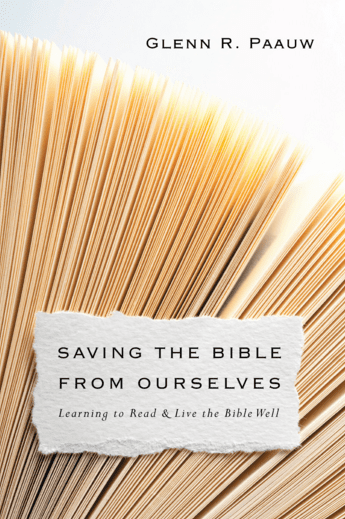 Chapter six of Ronald E Osborn’s new book Death Before the Fall: Biblical Literalism and the Problem of Animal Suffering looks at the enclave mentality in American fundamentalism, especially as it relates to biblical literalism. Osborn’s description the fundamentalist approach seems a bit extreme at times – although we will all see elements of truth in this description. It is also important to understand that Osborn is speaking from his experience.
Chapter six of Ronald E Osborn’s new book Death Before the Fall: Biblical Literalism and the Problem of Animal Suffering looks at the enclave mentality in American fundamentalism, especially as it relates to biblical literalism. Osborn’s description the fundamentalist approach seems a bit extreme at times – although we will all see elements of truth in this description. It is also important to understand that Osborn is speaking from his experience.
But for the true believer … intellectual honesty does not mean following the empirical and inferential trails where ever they may lead. It means holding fast to the inerrant words of the sacred text at all costs. Where others interpret the Bible according to their fallible human reasoning, literalists (in their own self-understandings) faithfully accept the Word of God and then courageously seek out the evidence to defend it. (p. 77)
While such extremes are not always the norm, there is certainly an outspoken cohort that follows along the lines that Osborn outlines. The text is to be accepted and pieces that seem to disagree with the favored method of interpretation are to by explained away. Osborn goes on to describe where this approach often leads.
The fundamentalist does not simply have a view of what Scripture means, arrived at through many years of prayer, meditation, careful study, humbly held and generously shared with others. Rather, she denies the very possibility that there can be other faithful ways of reading the sacred text using different hermeneutical lenses. He insists that others are not simply mistaken but that they must be morally dishonest, intellectually deficient, or spiritually bankrupt for refusing to accept the self-evident truth. She strives not to simply persuade others with winsome reasoning in a shared quest for new light but to silence those she believes are corrupting the community (and especially the young) with ideas not based upon God’s infallible Word but corrupt human science and reasoning. (pp. 79-80)
For many sola scriptura means that we have the truth (in our interpretation), the whole truth, and nothing but the truth … and the truth will set us free (or should that be keep us bound?). This isn’t a reliance on scripture alone but a reliance on politically authorized (and supposedly self-evident) interpretations of scripture. The logic behind this reasoning leads to the oft expressed view that Genesis 1 must be interpreted as six twenty-four hour days or we cannot believe in the resurrection.
But wait, this gets good! I don’t want to dwell on Osborn’s negative critique, but rather to move on to an insight he offers at the end of the chapter. This may get us (at least some of us) moving forward.
Osborn suggests that perhaps we will move forward if we see Scripture not as the trumping source of authoritative knowledge, …
… but rather in terms of the noncoercive, nonviolent authority of a witness that continually evokes and invites open-ended conversation about its meanings. The unique or sole authority of Scripture would in this case lie … in the way that reading Scripture in communion with others who are committed to making its narrative central to their lives teaches us how to ask and re-ask the right kinds of questions in the midst of new realities with the right kind of responsiveness to the Other with whom we may have unresolved – and possibly unresolvable – disagreements
One can only be true to the principle of sola scriptura, I am suggesting, if one is also committed to the principle that the biblical narratives – precisely because they are narratives as opposed to rationalistic syllogisms – draw us into a continuous dialogue that must always strive for the greatest possible inclusion of voices among those who desire to be part of the conversation. (pp. 83-84)
Osborn (following N.T. Wright, who he quotes in this section) points out that the kind of authority so many want to assign to scripture “reflects not a higher but rather a lower view of scripture.” (p. 85) The Bible is a narrative, and we need to be immersed in this narrative and in an ongoing conversation in, about, and through the narrative. It needs to be a conversation, with ideas on the table and up for discussion. This includes the creation narratives, the focus of his book, but it also includes the so-called “silencing” texts in 1 Cor. 14 and 1 Timothy 2, the message that Jesus had for the Scribes and Pharisees, what it means to have true religion (according to James), the story of Israel, the prophets, the Gospels and more. Osborn suggests, and I agree, that sola scriptura doesn’t work, can’t work, when it degenerates to simple acceptance of some authoritative interpretation of Scripture. It only works when we bring the narrative home and wrestle with it afresh in conversation and in Christian community and make it our own. We need teachers, but we need teachers who lead discussion classes and seminars – not lecturers who deliver the final answers to be tested in multiple choice or true/false form. (Yes there is a place for preaching, but it is only the beginning, not the pinnacle of Christian teaching.)
What do you think of sola scriptura? What does this really mean?
If you wish to contact me directly you may do so at rjs4mail[at]att.net
If interested you can subscribe to a full text feed of my posts at Musings on Science and Theology.











